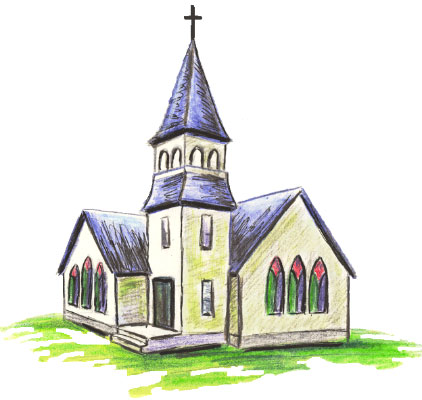Who goes there?
 2 Peter 2:1, False teachers…destructive heresies. When did several prominent but destructive, non-biblical heresies creep into the early church, which are now major doctrines in mainstream Christianity? Here is a partial list along with the approximate times the early church fathers began teaching these doctrines.
2 Peter 2:1, False teachers…destructive heresies. When did several prominent but destructive, non-biblical heresies creep into the early church, which are now major doctrines in mainstream Christianity? Here is a partial list along with the approximate times the early church fathers began teaching these doctrines.
The Human Soul Is Immortal
The immortality of the soul was not a Hebraic concept, but originated from the ancient Greek philosophers. This pagan concept made its way into the church as Gentiles who were steeped in the thinking of the Greek philosophers gained control of the early church after the death of the last apostles.
A.D. 130— The Epistle of Mathetes to Diognetus, ch. 6
Ca. A.D. 155—The First Apology of Justin Martyr, ch. 18
Ca. A.D. 180—Irenaeus’ Against Heresies, Book Two, ch. 34
Ca. A.D. 180—Irenaeus’ Against Heresies, Book Five, chaps. 7.1; 31.1
Teachings Against the Sabbath and Biblical Feasts
There is no record in the Bible of the early New Testament believers replacing the seventh-day Sabbath with Sunday. To say so is wishful thinking, a twisting of the Scriptures and biblical revisionism. It wasn’t until the fourth century at the Council of Nicea under Roman emperor Constantine that the Sunday officially replaced the Sabbath in the early church. Until that time, many Christian churches still observed the Sabbath throughout the Roman empire. The process of transitioning from Sabbath to Sunday observance was a slow one beginning in the early second century and had its roots largely in antisemitism.
A.D. 130—The Epistle of Mathetes to Diognetus, ch. 4. The author calls the Sabbath and biblical feasts “utterly ridiculous and unworthy of notice.”
Ca. A.D. 130—Epistle of Barnabas, ch. 2 (also ch. 14). The author says that the Sabbaths (weekly Sabbath and biblical feasts) are abolished.
Early part of second century A.D.—Epistle of Ignatius to the Philippians, ch. 14
Observance of the Lord’s Day (Sunday) Advocated Over Sabbath Observance
Early part of second century A.D.—Epistle of Ignatius to the Magnesian, ch. 9. The author says to keep the Sabbath on Sunday.
Early part of second century A.D.—Epistle of Ignatius to the Trallians, ch. 9
Ca. A.D. 130—Epistle of Barnabas, ch. 14
Ca. A.D. 155—The First Apology of Justin Martyr, ch. 67
Teachings Against the Torah
Early part of second century A.D.—Epistle of Ignatius to the Philadelphians, ch. 6. The author declare, “If anyone preach the Jewish law, listen not to him.”
Early part of second century A.D.—Epistle of Ignatius to the Magnesian, ch. 10
Ca. A.D. 155—The First Apology of Justin Martyr, ch. 47. The author states that out of “weak-mindedness,” some Christians observe the Mosaic law. Sabbath and feast days observance are optional, but not encouraged.
Anti-Semetic/Anti-Torah Theology
Early part of second century A.D.—Epistle of Ignatius to the Magnesian, chaps. 8, 10
Ca. A.D. 180—Irenaeus’ Against Heresies, Book Four, ch. 16.4. The author declares that the Decalogue was not cancelled by the New Covenant, but the statues and judgments of the Torah were a bondage to the Israelites and are no longer binding on Christians.
Teachings Against the Biblical Dietary Laws of Clean and Unclean Meats
Early part of second century A.D.—Epistle of Ignatius to the Philadelphians, ch. 6. The author states that one who adheres the biblical dietary laws “has the apostate dragon dwelling within him.”
Easter Celebration Established a Christian Holiday
Ca. A.D. 150—The celebration of the resurrection within the early church began in the middle of the second century (History of the Christian Church, vol. 2, pp. 207–8, by Philip Schaff). The date of Easter and its formal establishment and disconnection from Passover occurred in A.D. 325 at the council of Nicea.
Sabbath Officially Changed to Sunday
A.D. 321—Sunday officially becomes the weekly day of worship (in place of the Sabbath) by a legal enactment of Emporer Constantine (History of the Christian Church, vol. 3, p. 378ff, by Philip Schaff; History of the Christianity, vol 1, p. 93, by Kenneth Scott Latourette)
Christmas Established as a Christian Holiday
Ca. A.D. 354—Christmas originated in the middle to the end of the fourth century as a Christian holiday as an outgrowth of a pagan festival celebrating the birth of the pagan sun god.




